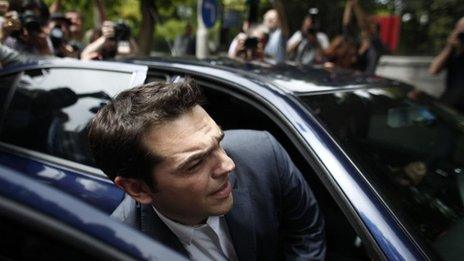Syriza's Tsipras to meet Greece's pro-bailout parties
- Published

The leader of Greece's left-wing Syriza bloc is continuing attempts to form a government after elections on Sunday produced an inconclusive result.
Alexis Tsipras has said he will try to form a coalition based on tearing up the terms of the EU/IMF bailout deal, which he describes as "barbaric".
On Wednesday, he is meeting the two mainstream pro-bailout parties, Pasok and New Democracy (ND).
If the two sides fail to agree, Greece could face fresh elections in weeks.
The financial chaos has sparked huge social unrest in Greece and led to a deep mistrust of the parties considered to be the architects of austerity.
Power vacuum?
Mr Tsipras wants a government that turns its back on cost-cutting and Greece's bailout commitments.
He secured agreement from one centre-left party on Tuesday.
After initial talks between Mr Tsipras and Pasok leader Evangelos Venizelos on Wednesday, Mr Venizelos said there had been no success so far in the coalition talks.
"At the current stage we cannot reach a deal, but must continue the effort," Mr Venizelos said.
Earlier on Wednesday, New Democracy leader Antonis Samaras clearly rejected Mr Tsipras's demand to scrap the bailout deal.
Mr Samaras told a party meeting that Mr Tsipras's proposal would "lead to immediate internal collapse and international bankruptcy, with the inevitable exit from Europe".
"[Amending] the loan deal is one thing, it is a completely different thing to unilaterally denounce it. The second option leads to catastrophe that is certain and immediate," he said.
The party leaders who signed the bailout deal are unlikely to agree to Mr Tsipras's terms, says the BBC's Mark Lowen in Athens.
If no deal is reached, a perilous power vacuum would be created, our correspondent says.
Greece would be unable to draw its international loan, meaning it would again face the prospect of bankruptcy and possible exit from the euro, he adds.
Newly elected Syriza MP Euclid Tsakalotos told the BBC that Germany should finance a plan for Greece similar to the Marshall Plan, the US-led aid effort which helped rebuild Germany after World War II.
Otherwise, he warned, the eurozone would collapse.
"The eurozone is going to collapse not because Greek leftists have said we've had enough of austerity and we can't have wages of the level of Bulgaria when we have prices at the level of Berlin; it's going to collapse because of these austerity measures," Mr Tsakalotos said.
The European Commission and Germany say countries must stick to budget cuts.
German Foreign Minister Guido Westerwelle urged Greece to keep its commitments; otherwise, he said, it risked leaving the euro.
Greek voter: "I do not think they will cooperate, at least for now"
"Germany would like to keep Greece in the eurozone, but Greece's fate is now in its own hands," he said on Wednesday. "Greece must decide for itself which route it will take."
New Democracy's share of the vote fell from 33.5% in 2009 to less than 19%, while Pasok plummeted from 43% to just over 13%.
In March, both parties backed the terms of the second EU/IMF deal agreed by technocrat Prime Minister Lucas Papademos.
In return for its two bailouts - worth a total of 240bn euros (£190bn; $310) - Greece agreed to make deep cuts to pensions and pay, raise taxes and slash thousands of public sector jobs.
Mr Tsipras made his position clear to reporters in a five-point plan:
- Cancelling the bailout terms, notably laws that further cut wages and pensions
- Scrapping laws that abolish workers' rights, particularly a law abolishing collective labour agreements due to come into effect on 15 May
- Promoting changes to deepen democracy and social justice
- Investigating Greece's banking system which received almost 200bn euros of public money
- Setting up an international committee to find out the causes of Greece's public deficit and putting on hold all debt servicing
Greek media said Mr Tsipras had enlisted the support of a smaller left-wing party, Democratic Left, but failed to persuade the communist KKE to back him. He is likely to talk to all the party leaders, except the ultra-nationalist Golden Dawn.